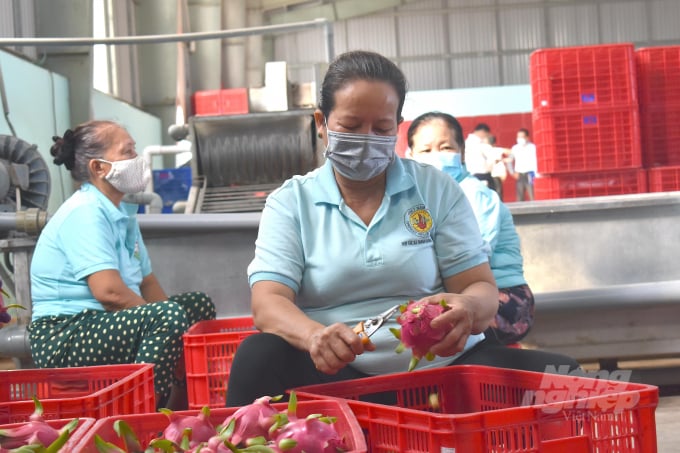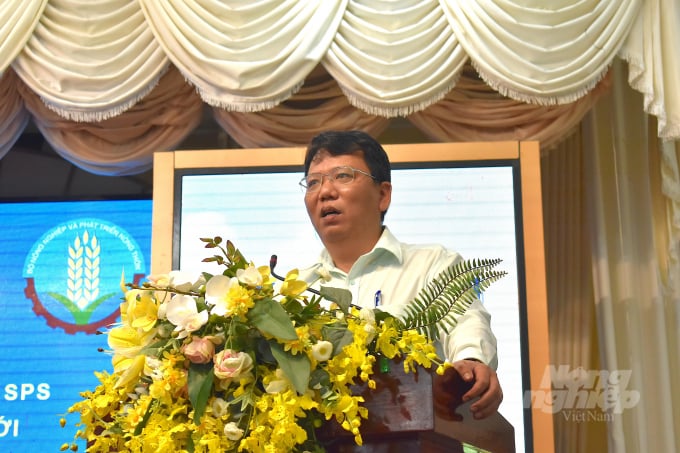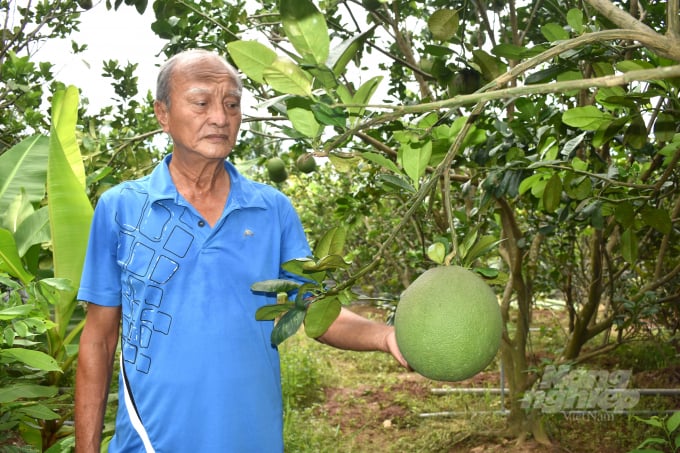November 27, 2025 | 23:52 GMT +7
November 27, 2025 | 23:52 GMT +7
Hotline: 0913.378.918
November 27, 2025 | 23:52 GMT +7
Hotline: 0913.378.918
On June 9, a workshop was organized in Long An province with the aim to disseminate regulations and implement commitments on SPS in the new generation FTAs; update on the Chinese market regulations. The workshop attracted scientists, functional unts, businesses and farmer organizations.
According to the SPS Vietnam, the Agreement on the Application of Sanitary and Phytosanitary Measures (SPS) includes 14 articles and 3 appendices. The content stipulates principles for determining criteria, requirements and measures to control Sanitary and Phytosanitary in animal, plant and animal-based diseases in international trade. The basic principles of SPS consist of freedom, openness, transparency, fairness and harmony. The four areas of SPS regulation include: Sanitary; Phytosanitary; environmental safety; labor safety.

The Chinese market consumes the majority of Vietnamese dragon fruit. Photo: Minh Dam.
SPS Vietnam is the official communication channel between Vietnam and WTO state members on matters related to SPS. The office acts as the focal point for the implementation of transparency obligations as required by the Agreement on the Application of Sanitary and Phytosanitary Measures of the World Trade Organization and other Free Trade Agreements that Vietnam has participated.
SPS Vietnam is a channel to inform and answer questions about the contents and regulations on Sanitary and Phytosanitary in animal and plant. It requires WTO state members to provide information on measures and procedures for risk assessment, inspection, examination and other issues related to Sanitary and Phytosanitary in animal and plant.
SPS measures are based on scienctific or international standards; they are transparent, non-discriminatory, namely: the EU SPS Regulation and information source on Sanitary for plant-based products; EU regulation on maximum residue levels for imported agricultural products, protection of geographical indications.
Dr. Ngo Xuan Nam, Deputy Director of SPS Vietnam said: Every year, WTO state members publish nearly 1,000 regulations and updates on Sanitary standards. If businesses and production organizations fail to update information on the requirements of the import market, they can easily violate. Most recently, China General Department of Customs has just issued regulations on Sanitary management with Order 248 , Order 249. If businesses are not proactive, they will face considerable damage when exporting to this market.

Dr. Ngo Xuan Nam said that every year, WTO state members publish nearly 1,000 regulations and updates on Sanitary standards. Photo: Minh Dam.
Ms. Vu Phuong Thao, Export Manager of ACECOOK Vietnam, said: The company exports key products including instant noodles, vermicelli, noodles, etc. Products mainly have agricultural origins. Ms. Thao added, the import standards of other countries are increasingly strict. If businesses cannot adapt in time, the damage will be huge, shipments face the possibility of being canceled, depending on the distribution channel.
According to Ms. Thao, businesses are currently lacking information channels on import market requirements similar to SPS Vietnam. This company previously did not know about SPS, and now when they do, Ms. Thao hopes to be updated on the information to have time to prepare. Businesses will accompany SPS to ask questions about Sanitary and Phytosanitary of importing countries.
Mr. Truong Van An, Director of Tam Vu dragon fruit cooperative shared the same opinion: The cooperative has 40 members with an area of 50 hectares; its farmers follow VietGAP standards in production. However, not all of their VietGap-certified products can be sold in every country. Each country has different standards that their members have to comply in order to export. 50% of the cooperative's exports to China consist of red flesh dragon fruit. The remaining ed flesh dragon fruit are exported to Japan, Thailand. Therefore, it is necessary to promptly update information to avoid losses.

Local authorities and businesses need to promptly update information on import market requirements to communicate with farmers. Photo: Minh Dam.
According to Mr. Nguyen Thanh Truyen, Director of Long An Department of Agriculture and Rural Development, the province has exported a great deal of agricultural products including rice, bananas, dragon fruit, jackfruit and so on, with a total export turnover of 503 million USD in 2021. However, the majority of these exports are small quota shipments to the Chinese market. Although Long An has been proactive from the very beginning in the work of information, dissemination and guidance for farmers and businesses on export market requirements. The province also organized various workshops to implement the regulations on Sanitary management by the General Administration of Customs of China according to Order 248, Order 249 and basic standards, procedures for monitoring planting areas, packaging facilities.
However, the consumption of agricultural products in Long An province still has difficulties. Most notably, the Chinese technical trade barriers affecting the province's businesses that failed to follow Orders 248, 249. This has had a negative impact on production and consumption, troubling farmers' lives.
Long An understands that the Chinese market is still the main export market for the province's key agricultural products. Therefore, Mr. Truyen suggested SPS Vietnam to hold a workshop on: “Disseminating regulations; implementing commitments on SPS in new generation FTAs and updating requirements on SPS by the Chinese market". This workshop is necessary for the consumption of local product, especially for dragon fruit exports to the Chinese market. The province currently has approximately 11,000 hectares of dragon fruit trees.
Mr. Truyen expected that after the workshop, managers and businesses will be fully aware of SPS as well as gain more information about SPS commitments in the new generation of free trade agreements. Additionally, they will acquire knowledge on regulations of the Chinese market for Vietnamese animal and plant product as well as the technology for fruits preliminary processing and organising for export to the Chinese market. "We need to change to integrate, to adapt and to compromise in our mindsets, we must act together to re-affirm the position and prestige of Vietnamese agricultural products in the international market", said Mr. Truyen.
Translated by Nguyen Hai Long

(VAN) After the institutional merger, Da Nang possesses significant forest-carbon reserves and is proactively engaging in the carbon market, creating a new revenue stream.

(VAN) An Giang strengthens communication against IUU fishing, increases inspections and sanctions, and is determined to remove the EC’s “yellow card” while developing a sustainable fisheries sector.

(VAN) As green transition becomes a global trajectory, Viet Nam’s biggest challenge is not only technology and models, but how to ensure that capital flows reach the right beneficiaries.

(VAN) The Ministry of Agriculture and Environment must spearhead the construction of green governance, spanning decision-making processes and investment standards to policy evaluation mechanisms.

(VAN) The Agriculture and Environment sector of Khanh Hoa has achieved numerous milestones over the past 80 years, contributing significantly to the goal of establishing the province as a centrally governed city by 2030.

(VAN) Viet Nam is entering the pivotal period of 2025-2030, moving toward the formulation of the Remote Sensing Law, which will establish a legal foundation for the development of national digital data.

(VAN) The agricultural sector is finalizing the strategic framework for emission reduction, setting the goal of sharply cutting methane and 403.7 million tons of CO2 equivalent and moving toward Net Zero by 2050.